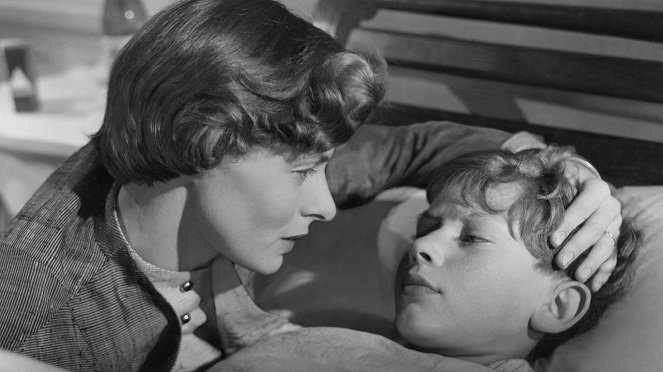Director:
Roberto RosselliniCámara:
Aldo TontiMúsica:
Renzo RosselliniReparto:
Ingrid Bergman, Alexander Knox, Rossana Rory, Giulietta Masina, Antonio Pietrangeli, Ettore Giannini, Marcella Rovena, Carlo Hinterman, William Tubbs (más)Streaming (1)
Sinopsis(1)
Europa 1951 narra la historia de Irene Gilrad, una americana rica que lleva en Roma una vida frívola en compañía de su marido George. Cuando su hijo pequeño se suicida al sentirse desatendido por su madre, Irene, devorada por los remordimientos, buscará primero auxilio en su primo Andrea, un militante comunista que le aconseja dedicarse al prójimo, y descubre en si misma una oculta espiritualidad. (Filmin)
(más)Reseñas (2)
A powerful drama about a woman who has lost a lot and wants to find meaning in life after a tragic event. She decides that the meaning lies in helping the poor, but her actions are not always met with understanding. It's as if such a person doesn't belong in modern society. The strength of the film comes from both the excellent direction and camera work, which is essentially indifferent, as well as the beautiful Ingrid Bergman, who is definitely more than just a pretty woman.
()
"Are you a communist?" - "No." - "Would you like to be a nun?" - "No," admits Ingrid Bergman at the end of the film. It could just as well be the epitaph of the fading neorealism of the time period, at least as far as Rossellini is concerned. The entire film is based on the tension between the personal story of a mother undergoing an inner transformation and a general message that the author (and the screenplay authors, as it is characteristic that Fellini was among them) wants to impress upon us. The whole film feels like a hidden advertisement for this message, where the main character is actually just a Trojan horse carrying the message, just as medieval legends were countless variations of advertisements for the truth of God. At first, the film feels like the intimate drama of one woman, then it turns into a social drama, and in the end, we witness a genuine parable of society as a whole (hence the depersonalizing title of the film). At the end of the film, there should be a warning about product placement, in this case, not about Red Bull or the proletariat, but about the grace of God. In my opinion, in this peculiar contradiction, which may not be a contradiction for some, the Italian neorealism in the film struggled, which diminished its power. In short, Rossellini attempts to provide us with a new version of religion while at the same time incorporating the atomic bomb era, the Cold War, the conflict between labor and capital, etc. The result, in my opinion, is slight schizophrenia. Nevertheless, this film is perfectly crafted, and all credit to it.
()


Anuncio